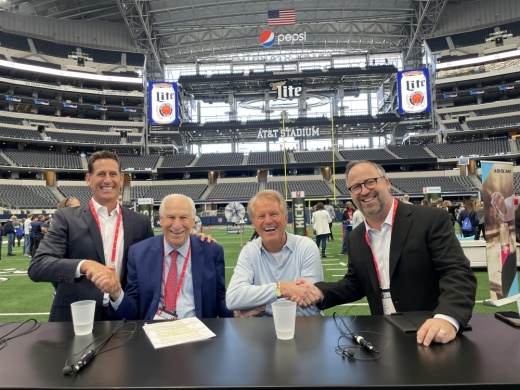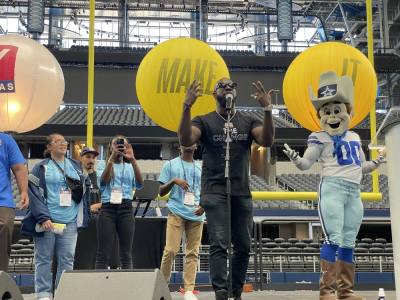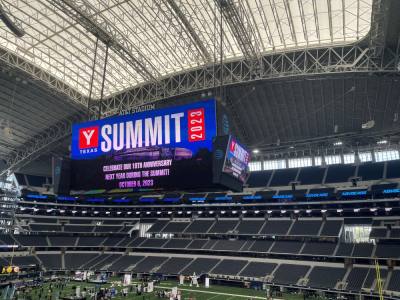Nearly 1,000 business professionals and students gathered at AT&T Stadium in Arlington on Sept. 30 for the inaugural YTexas Summit, which featured networking, on-field exhibitions and business panels discussing the future of economic development in Texas.
YTexas CEO Ed Curtis said the mission of the organization is all about giving Texas professionals the opportunity to expand their network across the state and helping young people find a career pathway that fulfills the state’s needs.
“We focus on education and workforce development, bringing the students in here and really creating an environment where we’re actually making a difference,” he said. “Instead of having a roundtable discussion and walking away with an action item, we’re actually putting it to use on the field and taking economic development to another level.”
The summit also presented an opportunity for business leaders in Austin and San Antonio to focus on the future of economic development throughout Texas.
One of the notable panel conversations discussed regionalism within Texas, focusing on the potential for Austin and San Antonio to grow into a super region. Community Impact CEO John Garrett and San Antonio Express News Publisher Mark Medici moderated the panel discussion and interviewed Charlie Amato, chair of the Southwest Business Corporation, and Roy Spence, chair and co-founder of the advertising agency GSD&M.
Garrett: One day, Austin and San Antonio are going to be a super region like Dallas-Fort Worth. And I'm just curious, when is it going to be more of a reality? Are San Antonio and Austin truly becoming a corridor, and what needs to happen for that to come to fruition?
Amato: I totally think it's already in motion. We're already communicating better—San Antonio, New Braunfels, San Marcos and Austin. You know, today, there's 4.6 million people in that corridor. And by 2030, they claim there's going to be 6.7 million people in that particular corridor. So I think the expansions [is] real, they're there. One of the primary things we need to be concerned about, of course, is infrastructure.
Spence: We all grew up in San Antonio, and 40 years ago, I drove [to San Antonio] every day and back to Austin every night. There used to be a huge gap between Austin and San Marcos, a beautiful country gap between San Marcos and New Braunfels. But if you drive there now, it's already a corridor. So the thing we have to do, I think, more than anything, is have leaders who want to sit down and meet people in the middle, right? Let’s talk about could we be better together? There's some pros and cons. But for sure, in education, we should be better together. And I think that would be a pretty strong region.
Medici: Let's talk about talent for a second before we get into the infrastructure conversation. There’s not a talent issue; the issue is retaining the talent after we get them out of school. How do we make sure that The University of Texas at Austin, The University of Texas at San Antonio, and Texas State are working in a collaborative way with the business community?
Amato: I think, No. 1, we're going to have to have competitive salaries and benefits. And the universities are already doing it. And I haven't had any dean's of the business school of UT call on me and come meet with my HR department. But I've had UTSA come see us and Texas State come see us. So I think the deans of the business schools are reaching out to the business community, and they're trying to form actual relationships with the business community, which I think is unbelievable.
Spence: How can we start reaching middle school kids and high school kids, and show them this new world of high-skill, high-income careers? Because they’re not jobs anymore—they’re careers. I've changed the paradigm. It's not just “higher ed, higher income,” it [should be] learn more, earn more—learn more as a doctor, learn more as a welder. Here's my point: if we get our young talent to be skilled professionals, they ain't leaving.
The group also brought up the importance of infrastructure in connecting the region, and Medici said it would be difficult to see Austin and San Antonio growing together without a train.
Medici: Rail in Texas is something that seems to be elusive. Do you really feel that’s something the state and the region can get behind?
Amato: I would hope and pray that the business community and our local elected officials can get behind it because we cannot go from 4.6 million to 7.6 million people in that quarter. Georgetown, Leander and New Braunfels, based on our population, are the fastest-growing cities in the nation. I think the Dallas-Fort Worth area and Arlington, they've done a tremendous job. Maybe we can learn from them. As far as the rail systems, I'd like our elected officials to go to Europe for about 30 years.
Spence: This is going to sound funny, but it's not [a joke]. I'm for rail. As long as it's not a Southwest Airlines corridor, because I represent Southwest. Let me tell you what, Southwest doesn't fly from Austin to San Antonio. The point is, out of all the corridors, the Austin-San Antonio [corridor] is born for rail. If we have visionary leaders who understand that in the end game, all we want is less people on the highway and more people on the trains. I'm telling you, this is a perfect corridor.
____________________________________________________________________________
The full interview is available on the YTexas website in addition to other panel discussions and videos from the event.
The YTexas team is already planning for the 10th anniversary and set the date for Oct. 6, 2023. The event will reflect on the past decade and will feature companies who previously participated in the event to do a decade in review.
“I hope people consider [YTexas] the one event every year that they absolutely, unequivocally have to go to,” Curtis said.







